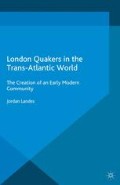Abstract
The establishment of the Gospel Order made possible the travelling ministry and political activity of the Josiah, from the approval and sup- port of Thomas Chalkley, William Ellis, Aaron Atkinson, and Thomas Turner to regular correspondence and lobbying in support of Maryland Friends. The following three chapters explore the activity of the London Yearly Meeting and its constituent meetings and their impact on emerg- ing Quaker trans-Atlantic networks, examining how these meetings created and maintained a trans-Atlantic community with the goal of a unified faith. The Second Day’s Morning Meeting (Morning Meeting) and the Meeting for Sufferings, collectively known as the ‘London meet- ings for discipline’,1 became essential to the flow of communication between London and more distant meetings, and chapters 1–3 describe how the meetings developed and utilized networks to enable com- munication. The structure of communication that developed between the London Yearly Meeting and colonial meetings required a level of control by the meetings for discipline over the religious message dis- tributed throughout the Quaker Atlantic world. Furthermore, reception and acceptance of that message by colonial Friends relied on a sense of community strengthened by the London Yearly Meeting’s networks. These trans-Atlantic networks were tested several times when colo- nial Quakers were challenged from within, but also by forces from outside the faith, and those situations allow historians to assess the London Yearly Meeting’s levels of control over the trans-Atlantic reli- gious message.
Access this chapter
Tax calculation will be finalised at checkout
Purchases are for personal use only
Preview
Unable to display preview. Download preview PDF.
Notes
Frederick B. Tolles, Quakers and the Atlantic Culture (New York: Macmillan, 1960), p. 9.
George Fox, The Journal of George Fox Edited From the MSS, Norman Penney, ed. (Cambridge: Cambridge University Press, 1911), II, p. 337.
Kate Peters, Print Culture and the Early Quakers (Cambridge: Cambridge University Press, 2005), p. 51
Hugh Barbour and J. William Frost, The Quakers (Richmond, IN: Friends United Press, 1994), p. 57.
Maurice Wigham, The Irish Quakers: A Short History of the Religious Society of Friends in Ireland (Dublin: Historical Committee of the Religious Society of Friends in Ireland, 1992), p. 36.
H. Larry Ingle, ‘Women on Women’s Roles: Mary Penington to Friends, 1678’, Signs, 16 (1991), 587–96
David Harris Sacks, The Widening Gate: Bristol and the Atlantic Economy 1450–1700 (Berkeley, CA: University of California Press, 1991), p. 319.
John Bergin, ‘The Quaker Lobby and Its Influence on Irish Legislation, 1692–1705’, Eighteenth-Century Ireland/Iris an da chultur, 19 (2004), 9–36
Copyright information
© 2015 Jordan Landes
About this chapter
Cite this chapter
Landes, J. (2015). Quaker Institutional Structures. In: London Quakers in the Trans-Atlantic World. Christianities in the Trans-Atlantic World, 1500–1800. Palgrave Macmillan, London. https://doi.org/10.1057/9781137366689_2
Download citation
DOI: https://doi.org/10.1057/9781137366689_2
Publisher Name: Palgrave Macmillan, London
Print ISBN: 978-1-349-47425-7
Online ISBN: 978-1-137-36668-9
eBook Packages: Palgrave History CollectionHistory (R0)

